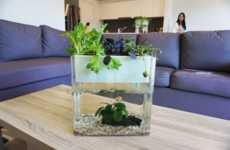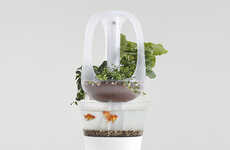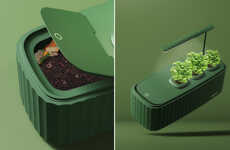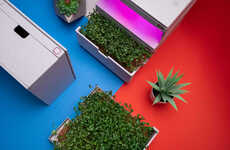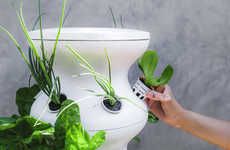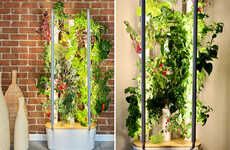
This 3d-Printed Ecosystem Lets You Grow Produce at Home Responsibly
David Ingram — November 6, 2015 — Eco
References: avooq & 3dprintingindustry
Australian design company Avooq released a free 3D-printed aquaponics system that acts like a tiny closed loop and ecologically balanced habitat.
The 'Cascaqua' combines plant and fish cultivation to create a miniature ecological system where a plant life cares for a fish and the fish does the same for the plant. This aquaponics system is actually based on ancient practices dating back to the Aztec civilization that combined fish farming and hydroponics.
The system works by converting the waste from a fish into ammonia that bacteria turns into nutrients. This nutrient-rich water is then pumped up to the plant where it's then watered and fed while also filtering the water. This natural filtering system then provides clean and oxygenated water back to the fish. With this sustainable system, home produce and pet ownership can be combined in one innovative 3D-printed design.
The 'Cascaqua' combines plant and fish cultivation to create a miniature ecological system where a plant life cares for a fish and the fish does the same for the plant. This aquaponics system is actually based on ancient practices dating back to the Aztec civilization that combined fish farming and hydroponics.
The system works by converting the waste from a fish into ammonia that bacteria turns into nutrients. This nutrient-rich water is then pumped up to the plant where it's then watered and fed while also filtering the water. This natural filtering system then provides clean and oxygenated water back to the fish. With this sustainable system, home produce and pet ownership can be combined in one innovative 3D-printed design.
Trend Themes
1. 3d-printed Aquaponics Systems - Innovative opportunities for sustainable and efficient home produce and pet ownership with the use of 3D-printed aquaponics systems.
2. Closed-loop Ecological Systems - Opportunities for the development of closed-loop ecological systems that combine plant and animal cultivation through 3D-printing technologies.
3. Hydroponic Farming - Potential for advancements in hydroponic farming through the integration of 3D-printing technologies in order to create more efficient and eco-friendly systems.
Industry Implications
1. Agriculture - The use of 3D-printed aquaponics systems presents opportunities for sustainable and efficient agricultural practices that have a minimal impact on the environment.
2. Home Gardening - The development of 3D-printed aquaponics systems encourages the growth of home gardening by providing an efficient and accessible way for individuals to grow their own produce.
3. Ecological Design - The integration of 3D-printing technologies in ecological design presents opportunities for the development of closed-loop systems that promote sustainable living practices.
6
Score
Popularity
Activity
Freshness


